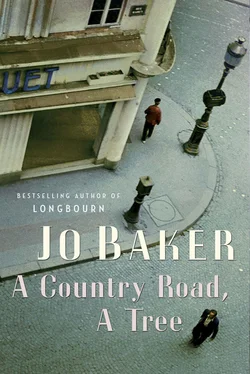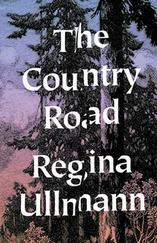When Yvonne and Roger leave, he goes through the evening rituals, aware for once of what are normally unconscious acts. He draws the shutters, bolts them, his hands old and knuckly and looking entirely alien to him. He is conscious of the barriers’ flimsiness, the arbitrariness of the space that they contain. He is conscious too of other spaces: the road down which Paul Léon had shrunk and faded; the concrete and worn grass ringed around with wire and Alfred Péron staring at the sky; a sunless cube in the depths of the Santé where chains hang from the wall; a swaying carriage rattling off towards the east, packed with deported people; his own skull and its pool of darkness, the shiver that grows at the base of it and slithers up into his hair.
Reaching round for the last shutter, he is leaning out into the empty night and is caught by the wide silence here. He feels observed. He goes to bolt the door. They have never been safe here, he knows; they had just failed to notice the danger. All it would take is a few guns, a few dogs, and the crows will be dealt with. Will be cleared entirely from the woods.
He climbs the stairs, rubbing at the back of his bristling neck.
She says, “I thought you would have heard us.”
“I was working.” He unbuttons his shirt, lifts it over his head. His shoulders ache.
“I thought you would have come down.”
“I did come down.”
Her lips twist.
“You could have called me,” he says. “If you’d called me I would have come.”
She blinks and looks away.
“Forgive me,” he says.
“We don’t all have your excuses. We don’t all have your consolations.”
He slings his trousers over the back of the chair, shakes his head, not understanding.
“Disappearing for hours like that.”
“I don’t disappear.”
“Even when you’re here, you’re not really here.”
She turns down the wick, blows out the flame. He climbs into bed beside her in the darkness. She shifts on to her side, away from him, dragging the blankets with her. Her breathing changes.
“What are we going to do?”
“The war will end,” she says. “We wait for that.”
“We have to do something.”
She makes a muffled noise. He looks at her dark head on the pillow.
“I can’t just wait,” he says, “to see what happens.”
She hefts the covers up over her shoulder. “Didn’t you learn anything from last time? Wasn’t that a big enough disaster?”
After a bit, he gets up and smokes a cigarette at the window. Miss Beamish’s house is unlit, but the windows catch a little moonlight. Beyond the road, the wind stirs the trees, and far away, over the treetops and across the valley, a light shines on the mountainside in contravention of the blackout. It flickers, flashes. It could just be the play of branches across a window. Or it could be that a message is blinking out into the darkness, that some kind of meaning is offered up into the night.
CHAPTER FIFTEEN THE VAUCLUSE, April 1944
Easter Sunday. There’s a run of farmers, tired women, slow-voiced farmhands, sleepy kids, down either side of the trestle table. It has been a warm and pleasant day, when you could slip into the delusion that, all around, the rest of the world went on just as it used to do. A haunch of pork has been roasted and demolished; scraps lie on the platter and from time to time someone helps themselves to a bit of cooked-crisp skin or a flake of meat. The talk hooks and twists itself together round him, and it is practical and about things and people he doesn’t know. He sits back from the table, a little out of the way, cradling his glass of wine. Suzanne sits in, her elbows perched, chin on hands, head tilted, engaged in a diagonal conversation with a woman further down the table.
“You know the family out at Saint-Michel?”
The fellow speaking to him is tipped back in his chair, leaning past the back of the man between them. He’s familiar, but then country folk are like that. The same few people swirling round and round and bumping into each other like flotsam in a whirlpool. The fellow sits with shirtsleeves rolled; his jacket is hanging from the back of his chair.
“Yes,” he says.
“Terrible business.” The fellow offers a hand. “I’m Bonhomme,” he says. “I’m a friend of Monsieur there, your employer.”
“The family believes the denunciation came from Apt,” he says, keeping his voice low. They are in good company here, but one must not make assumptions.
The fellow tilts his head. “It must have.”
He wonders at the certainty. And then he remembers where he’d seen this man: the back room of the post office, pocketing a sheaf of letters, the postmistress’s anxious look on noticing that they were observed. He was going through the mail. He must have been weeding out denunciations, betrayals, reports to the authorities. They could all of them have been informed on many times over, but the words not allowed to hit their mark.
“You keep busy, then?” he asks.
“There is always much to do.”
As they talk, a moth bumps at the candle-lamp, and he thinks of all those letters written, their earnest treachery, their interception and curtailment. The flames that do not catch.
He doesn’t notice Suzanne watching them, her eyes narrowing.
Bonhomme wafts the moth away, tilts the candle-lamp and opens it to light his cigarette, then closes the lamp again before the moth can blunder in and immolate itself. He speaks casually, but very low. “Are you looking for more work?”
“I have enough to get by.”
“Getting by,” Bonhomme says, “is just the half of it.”
“And the other half?”
“One must add something. Contribute.”
He nods slowly.
Bonhomme looks at him. A long, assessing gaze. He says, “I think you will.”
—
The moon is bright and high as they walk home. The cicadas are making a racket. They climb the hill, following the path alongside the vines. They pass through trees, then out into a meadow, where the grass is long and cows stand and stare at them. Above, the sky is vast and bright with stars. Disturbed by their passing, moths rise from the grass, fluttering in ghostly white spirals. It’s beautiful; Suzanne feels this as gooseflesh on her arms and a lightness in her chest, at the loveliness of it and its fragility.
He’s drunk, and so there’s no point talking to him. Hands stuffed into his pockets, he stumbles forward, leaning as though into a ferocious wind. The grass around his turn-ups goes hush, hush. And she knows that no good will come of talking.
“You’re drunk,” she says, nonetheless.
He considers this. “Yes,” he says.
Never sufficient to just take a glass, a taste. Oh no. Heads together with that maquis leader all night. And now he is ripped to bits he’ll be as unshiftable as an oil stain. The carelessness, the risk; she can feel the fury swell. How dare he do this to them again now, when things are so precarious? No point even saying it. But.
“You were talking to that man,” she says. “I saw you.”
He stops now too, turns back to her. “So?”
“He’s a maquisard. ”
“I believe so.”
“I saw the way you were talking.”
“You’re jealous?”
“Name of God.”
“Maybe we were talking about the weather.”
She tsks. “You know nothing. You do not know this place. You have no idea.”
“He says I’ll do.”
“Do for what?”
He shrugs. “Whatever’s necessary.” He walks on.
She slumps with defeat. The night air is cool but she feels hot and unhappy and resentful and stuck, in the midst of all this mess, which has been piled so high around her that she cannot move a finger without risking more falling down on top of her. And he just keeps adding to the heap.
Читать дальше










